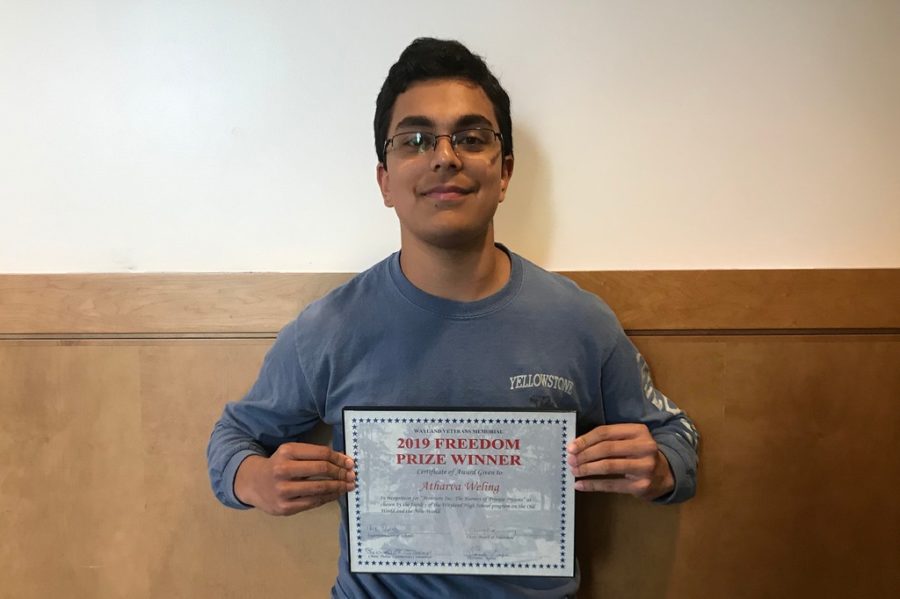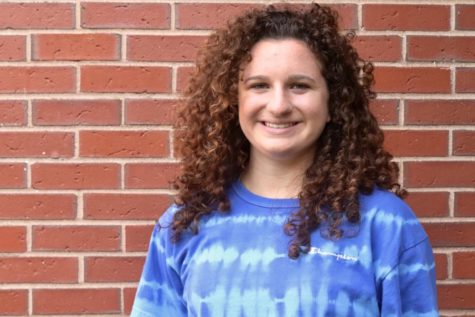Atharva Weling named winner of Freedom Prize
Sophomore Atharva Weling is named the winner of the 14th annual Freedom Prize Essay Contest. Along with a framed certificate, Weling was rewarded with a $500 check which he plans to use as a jumpstart to his summer job search.
June 19, 2019
Sophomore Atharva Weling is the winner of the 14th annual Freedom Prize Essay contest. Not only does Weling get to put this honorary title on his future college resumé, but he also walked away with a $500 check and a framed certificate.
Each year, all 10th graders at WHS write essays regarding freedom in our country, arguing for or against their designated topic. Weling’s paper, discussing the dangers of private prisons, stood out to history teacher Sean Chase and was submitted to a panel of judges as a Freedom Prize essay finalist.
“For me, [Weling’s paper] immediately jumped out of the pile because it was well-researched and well-written,” Chase said. “It was a topic that is certainly relevant in today’s world.”
Weling insists that students who wish to write a stellar paper should choose a topic that doesn’t follow the mainstream topics. He believes that writing a unique paper is key to catching the reader’s attention.
“The fact that my topic was not mainstream is what I think made it stand out because people might be more eager to learn and read about it,” Weling said.
Unlike many students, Weling didn’t begin drafting his paper until six days before the due date. He admits to falling victim of procrastination, but he still claims to have felt confident after turning in his paper five minutes before it would’ve been marked late. Even with confidence, however, Weling was shocked when he found out his paper was submitted for the grand prize.
“I didn’t really expect to be nominated,” Weling said. “It was not my plan going into it.”
Weling didn’t receive any help from his teacher, but only a few grammatical corrections from friends who proofread the paper. With such little help, Weling expected nothing more than to be a runner-up against his two other finalist classmates.
“I knew that by some miracle of Jesus my paper was at least a runner up,” Weling said. “I actually expected it to be a runner-up. When they called my name, I was a little surprised.”
Both Chase and Weling emphasize the importance of writing a paper that sparks personal interest in order to write a compelling essay that has a chance at being a finalist.
“It doesn’t matter how great of a writer you are, you have to write about something that’s [relevant] and that matters to you,” Weling said.
In the end, this essay is designed to give students the opportunity to explore a historical topic of their choice with the potential of receiving a reward. Chase hopes that it sparks creativity and genuine interest in writing the paper.
“At its very core, it’s a good old fashioned historical research paper, so there’s a lot of grunt work involved,” Chase said. “It’s an important skill to have as you leave Wayland High School to go on to the university level, [and] it does allow [students] to be creative in an academic sense and really dig their teeth into something that they’re drawn to.”





![Last Wednesday, the Wayland School Committee gathered to discuss a number of topics regarding the health curriculum and Innovation Career Pathway course. Another large topic of conversation was the ways to potentially mitigate distracting cell phone usage. "These [phones] are going to distract your learning and social relationships," Superintendent David Fleishman said. "That's concrete right there."](https://waylandstudentpress.com/wp-content/uploads/2025/06/Screenshot-2025-06-04-at-9.49.31 PM-1200x886.png)



























![Troy Hoyt finishes the Boston Marathon, running for the Hoyt Foundation. T. Hoyt is the son of Hoyt Foundation CEO Russ Hoyt.
“[Running a marathon] might seem like a big thing, when it’s presented to you at first, but if you break it up and just keep telling yourself, “Yes, you can,” you can start chipping away at it. And before you know it, you’ll be running the whole 26 miles, and you won’t even think twice about it.” T. Hoyt said.](https://waylandstudentpress.com/wp-content/uploads/2025/04/C36E8761-1CBB-452E-9DF2-543EF7B1095E_1_105_c.jpeg)













































